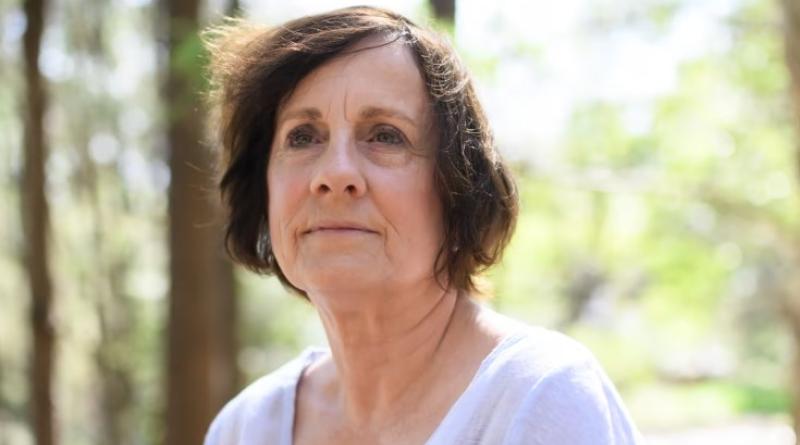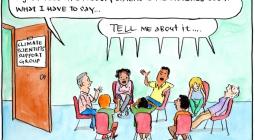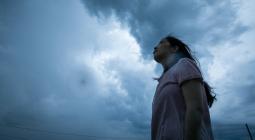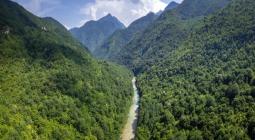‘Hope has to be a strategy’: the scientist who refused to let the climate warmongers win

As one of Australia’s most influential voices on climate, Lesley Hughes has thought deeply about how to talk about the crisis and says hope has a key role to play
“I think for most climate change scientists, we become quite good at partitioning off bits of our brain,” says Lesley Hughes.
“You put all the negative stuff in a little box and you put a wall around it and you try to keep going.”
But in the record-breaking year that 2023 has become, some of the dread and grief has broken out of Hughes’s mental box and vaulted the wall.
There have been sleepless nights, where she’s pondered the future for her family, the natural places she loves and for the species being lost.
“I do grieve,” the ecologist tells Guardian Australia at her home on Sydney’s lower north shore. “But I’ve never done it on camera.”
Hughes is one of Australia’s most recognisable and influential voices on the climate crisis.
In 2011 she was invited to join the Gillard government’s Climate Commission – a group tasked with educating the public about climate science and the need to cut carbon emissions.
This was in the middle of Australia’s climate wars. Scientists were getting threatening emails and phone calls from members of the public and Australians were deeply divided due to partisan media commentary and claims a “carbon tax” would cripple the economy and the coal and gas industries.
Politically, the commission was trying to secure public support for a price on carbon by countering a lack of understanding of the science. This confusion wasn’t helped by a rump of denial, headed by then opposition leader Tony Abbott, who had described climate science as “absolute crap”.
Two days before the commission’s first public presentation at a town hall in Geelong, Abbott had appeared on a stage at an anti-carbon tax rally in Canberra in front of a banner that read “JuLiar… Bob Brown’s BITCH.”
Hughes remembers being on stage in Geelong and hearing a loud bang from the direction of the commission’s chair, scientist Tim Flannery.
“My first thought was: Tim’s been shot. It sounded like a gunshot. And because the atmosphere was so toxic generally, that was my first thought.”
The gunshot was the sound of a fainting cameraman and his gear hitting the floor under the heat of the stage lights. But that Hughes’s first thought was of an assassination attempt says much about the toxicity of the time.
Abbott won the next election and scrapped the commission, spawning a crowdfunding campaign and a new not-for-profit science and advocacy group, the Climate Council, where she has remained as a councillor.
Last year, Hughes accepted an invitation from the energy minister, Chris Bowen, to join the government’s Climate Change Authority, which gives advice on policy and targets. She’s the authority’s only climate scientist.
‘A mercenary introduction’
Before all that, Hughes was recognised as an accomplished biologist and was among the first to sound the alarm that a warming planet would have far-reaching and catastrophic effects on species and ecosystems.
She did her PhD on ants but “figured I didn’t want to spend the rest of my career” following them around the Australian bush. It was her supervisor who suggested, sometime in 1989, that she look at global warming.
“I thought, oh well, if I do something that sounds a bit more applied and a bit more important, maybe I’ll actually get a job. So I had quite a mercenary introduction to climate change – I can confess that.”
She says it was clear, even then, that the climate crisis was going to mean trouble for many species.
“I was interested in that sort of geographical question. You know, as the climate changes, will the species in this location be able to survive or will they need to go somewhere else to be comfortable.”
By the mid 1990s, Hughes was already floating the deeply controversial idea that some plant species should be moved to places that, as the climate heated, would better suit them. Hughes argued any damage done “is likely to be less than the damage done by inaction”.
In 2000, after reviewing scientific studies from around the world, she wrote one of the first academic papers showing climate change was already affecting species globally.
“I’ve always felt for probably 20 or 30 years that we should have been doing things like moving species to more suitable habitats. It’s ironically much easier in Australia, and everywhere, to do negative things to the environment than to stage positive interventions.”
In 2004, she co-authored a study published on the front cover of the prestigious journal Nature that suggested by 2050 global heating could push as many as one-third or more of species on to a terminal route to extinction.
Slowly and almost imperceptibly, there were two shifts occurring in Hughes’s career. She was being asked to be an advocate for the science and then for action, and she was starting to see the climate crisis as not just an intellectual pursuit, but also a moral one.
‘People want to know’
Hughes is talking to Guardian Australia in the spring of 2023. All the forecasts point to a brutal summer. Countries in the northern hemisphere have been smashed by fire and flood and there are fears Australia will be next.
“You know, as a climate science communicator, those are the times when you actually have to sensitively use catastrophes to make a point. And that sounds like a really hard-nosed, mercenary thing. But given that’s what climate change means – it means it’s happening more and more frequently and worse and worse – we can’t afford to let those teaching moments go past.”
She says those who say we shouldn’t talk about climate in the middle of fossil fuel-driven disasters “tend to be conservative climate sceptics anyway”.
“People who are going through those sorts of events, they want to know why. They want an explanation. Giving them the climate science explanation is actually more meaningful than brushing it aside and saying, ‘Oh, we can’t talk about this now’.”
Hughes has used her optimism and hopefulness like a superpower to protect herself from grief and dread.
This year, it’s been a challenge, she says. One chart showing a drastic loss of Antarctic sea ice “really did hit me in the face”, she says. “I did wake up at night thinking about that.”
She says snorkelling over the Great Barrier Reef, as she has done many times, can also be an emotional wrench.
“That’s when it really comes home to me, because you snorkel in these gorgeous places with this incredible life and you think … in 10, 20, 30 years time. Will this all be gone? And that’s when it makes me cry.
“I’m a pretty resilient person. And because I’ve been in the climate change area for so long, you kind of get used to having that sort of vague worry all the time. But if you let it define you, then you become pretty useless.
“You know, from a purely science perspective, if you only think about just the black and white science, it’s a very, very grim picture going forward.
“But if you then also twin that with thinking about hope, optimism, motivation, ingenuity, innovation, motivation, the role of people that care, that kind of leavens the catastrophising.”
Hughes’s answer is a demonstration of her philosophy on hope.
“I’m optimistic about the future. I’ve come to the conclusion that hope has to be a strategy,” she says.
“You have to use hope as a motivator to keep going, because if you give up, if I give up, if all of the other scientists give up, if all of the other advocates and people that care give up, then we are lost.
“We can’t afford to give up. Therefore, we have to keep hopeful.”
Photograph: James Gourley - Lesley Hughes, a high-profile voice on climate in Australia





